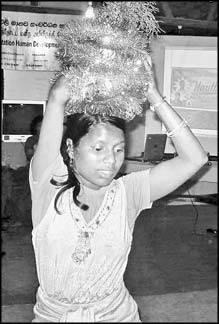Developing estate youth as an investment for the future
A young medical doctor whose mother plucks two leaves and a bud in a
tea estate is an amazing accomplishment for the entire nation. Now
however higher education among children of estate workers is no longer a
rare phenomenon.
In fact there are several undergraduates among this year’s university
entrants whose parents work in plantations. In addition, there are two
medical students, one engineering student and five more in other
faculties.
 This illustrates the change that is taking place in the estates and
how the single-minded goal of the Regional Plantation Companies to
promote the physical, mental, social and spiritual well-being of the
estate community in support of government policy is resulting in
stimulating ambition and commitment among the new generation growing up
in the tea plantations. This illustrates the change that is taking place in the estates and
how the single-minded goal of the Regional Plantation Companies to
promote the physical, mental, social and spiritual well-being of the
estate community in support of government policy is resulting in
stimulating ambition and commitment among the new generation growing up
in the tea plantations.
This is achieved through the Plantation Human Development Trust (PHDT)
that has been set up to coordinate an array of activities that bolster
the quality of life of estate workers in 430 plantations that come under
Regional Plantation Companies (RPC), Janatha Estate Development Board (JEDB)
and Sri Lanka State Plantations Corporation (SLSPC). These activities
pivot around maternal care, child nutrition, disease control, family
development, even housing and sanitation.
Pressing problems in estates such as the prevalence of worm
infestation and anaemia among the plantation community are also
addressed through de-worming programs and improved sanitation.
A study conducted by the Sri Lanka Business Development Centre on the
perceptions of estate youth revealed that they were appreciative of the
welfare programs implemented during the past two decades, particularly
in improved housing and sanitation, as well as the availability of
pipe-borne water and electricity that have made a tremendous difference
to life in the estates.
However the most important function that contributes is the skills
development program. The objective of this program is to develop
self-confidence and self-reliance among the adolescents in the
estates so that armed with the required life skills, they would become
valuable investments for the future, with carefully nurtured talents and
skills resulting in improved productivity, that is a vital need for Sri
Lanka to maintain its competitive edge in the world tea market.
One example of developing skills of the next generation of estate
workers was a youth camp held at the Green Hill Retreat Centre in
Kotagala.
Here in the picturesque surroundings, 150 young men and women in the
12-20 age group learned how to meet the challenges of day-to-day life
with greater success. Among the range of skills they were infused with
was decision-making, with emphasis on making the right decision at the
right time, overcoming impulse, aggression, procrastination, and
allowing others to make the decision.
Problem solving was also in the agenda and the group was able to
understand that unsolved problems cause mental depression.
Creative thinking was encouraged and so was analytical thinking, so
that the participants would be equipped to look at a situation from all
angles, and make an unbiased and impartial assessment, and come to a
correct conclusion, particularly when exposed to media propaganda.
The course modules were designed to inculcate effective
communication, build interpersonal skills and develop greater awareness
and understanding of emotions.
These sessions helped to educate the youthful participants on
healthcare, maternal and child nutrition and focused on the prevention
of teenage pregnancies, HIV/AIDS, alcohol and drug abuse, that often
reach high proportions ultimately impacting on reducing the quality of
life in the estates.
The youth camp was also an opportunity for the young people to show
off their talents in dancing, music, singing and public speaking.
Similar youth camps were held in Badulla, Nuwara Eliya and Hatton with
altogether over 475 estate youths benefiting from the programs.
Under the auspices of the RPCs, the role played by the PHDT extends
far beyond skills training to create a positive change of attitude and a
better quality of life among the estate population in Sri Lanka.
|

